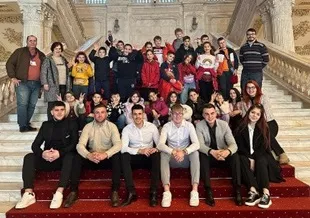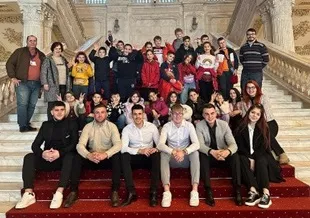Summary
Rural Youth Parliament is an Erasmus+ project that between 2022 and 2024 engaged and empowered around 500 young people from disadvantaged rural areas in Romania, Finland, France and Lithuania to become active in participatory processes. The project developed tools on its methodology and a guide on best practices for transnational cooperation for rural youth engagement which have been disseminated at multiple conferences across Europe.
Results
- Rural Youth Parliament simulations: 11 sessions in Romania and the Republic of Moldova, involving around 250 young participants. Young people in remaining countries were engaged as follows: 100 in Lithuania, 90 in France and 50 in Finland.
- Training and capacity building during the preparation, hosting and evaluation of the Rural Youth Parliament sessions on: analytical and diplomatic skills; communication; argumentative and organisational competencies; and development of logical, open-minded and empathetic attitudes.
- Training of an additional 20 youth workers in the use of the Rural Youth Parliament methodology and the project’s guide and tools.
- Guide on best practices for transnational cooperation for rural youth engagement – a tool for youth workers and collaborating organisations interested in organising Rural Youth Parliament simulations.
- Methodology for organising rural youth parliaments as tools for active engagement in disadvantaged communities.
- Dissemination and learning events in Lithuania, Romania and France, showcasing the project outcomes and Rural Youth Parliament simulations to public and private organisations working with youth.
- Financially and environmentally sustainable, the Rural Youth Parliament simulations offer digital training for young workers at minimal cost.
Resources
Documents
Context
The initiative targeted young people from rural areas in Romania, France, Finland and Lithuania, where opportunities for socialisation and engagement in activities that educate about democratic values and participation are scarce. The targeted rural areas lacked extracurricular activities that could support the personal development of youngsters.
The project provided young people with an opportunity to participate in simulations of a rural youth parliament. These included public debate sessions through which young people could enhance their social and communication skills, while becoming familiar with procedures encouraging free speaking and problem solving.
Objectives
The project's primary aim was to engage young individuals in disadvantaged rural areas in decision-making processes, fostering the development of new skills and positive attitudes towards democratic values through practical and interactive activities. Specific objectives included:
-
Setting up a functioning method to simulate rural youth parliaments as a means of activating and engaging young people in their local communities;
-
Strengthening and enhancing cooperation among organisations active in the field of youth work;
-
Developing and implementing innovative practices, methods and an online guide of practical tools to support youth engagement;
-
Training youth through participation in local rural youth parliaments to become acquainted with the method and replicate it.
Activities, key actors, and timeline
The project began by examining existing parliament simulations, creating an inventory, and subsequently analysing how to adapt them into a model tailored to the realities of rural areas covered by the partners. The resulting methodology, in the form of a digital toolbox, outlines practical steps for organising a rural youth parliament, including logistical aspects and participant engagement.
A communication strategy incorporated various channels, tailored messages and intermediary organisations to reach youth in rural areas and motivate them to join the initiative in each territory.
Recruitment events served to integrate as many participants as possible, spanning various trades and ages. Through these and the involvement of public and private actors, the project identified participation issues and needs encountered by young people, which resulted in the development of a precise inventory.
Training featuring debating exercises and preparation of discussion topics equipped youngsters with the necessary skills to effectively participate in the simulated parliamentary sessions.
The project carried out an evaluation of the simulations to assess participant feedback and reflect on improvements for future sessions.
Success factors/lessons learnt
The project adapted different methodologies to the needs of young people in rural areas through practical activities, providing youth workers with easy-to-use, interactive tools.
It is important to be mindful of the initial anxiety some young people may have at the beginning of the simulations. It is necessary to prepare tools and activities, such as ice-breakers, in order to mitigate shyness or stage fright and foster confidence.
The mentoring provided through open dialogues, feedback sessions and debates with local decision-makers and councillors and experienced guest speakers encouraged young people to express real needs and problems, in line with the project objectives.
Contacts
Iulia Gordon: iulia.gordon@napocaporolissum.ro
+40 751 054 190

